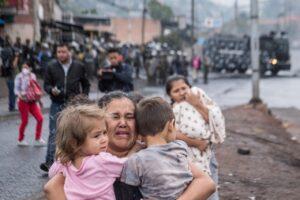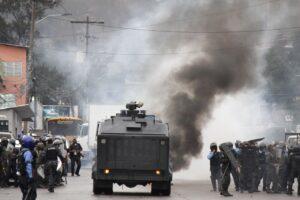Grassroots International Board Member Recounts Experience in Honduras During Electoral Crisis
During the tumultuous weeks surrounding the November 26th general election in Honduras, Grassroots International Board member and filmmaker, Sam Vinal, was in the country filming for the documentary BERTA SOY YO. Sam had a front-row seat as the electoral crisis unfolded and social movements mobilized in support of democracy and justice. Below is an interview with Sam after his return.
GRI: Why you were in Honduras last month?
Sam Vinal: We were filming a documentary about Berta Cáceres, exploring what interests conspired to kill her and who those who are is carrying on her work. We strategically planned to be there for the elections, but no one knew how it would unfold, and what degree of electoral fraud and government repression would happen.
Grassroots: What did you see during the election?
Sam: We were mainly in Tegucigalpa during the electoral crisis, where we got a very interesting snapshot. We started by going to TSE [Electoral Supreme Court], the body charged with counting and ensuring a fair election. We filmed there one day without audio, which we negotiated to be able to do, and noticed that there were no international electoral observers. When we asked about this, we were told: there were a ton of observers yesterday. Keep in mind that the vote had been going on up until December 18 [and this was November 29], where they have been recounting different actors, or ballot boxes of each department. So they were counting without any observers. Irregularities in that led the OAS [Organization of American States] to declare they don’t recognize it as a legitimate election for 3 points, including general variance which is suspicious.
The Economist conducted an interview with someone trained to work at the TSE. She said she was given specific instructions to stuff ballots for [incumbent candidate Juan Orlando Hernandez] JOH, and put mark ballots for [opposition candidate Salvador ] Nasralla as a means to nullify them.
“The rigging of the presidential election has not only violated the will of the people. It has proven that corrupt nature of an anti-democratic administration that cannot be trusted to lead the people.”
Grassroots: In the initial day or two after the election, the Supreme Electoral Tribunal (TSE) announced that the opposition candidate was leading the vote count. They later went silent for a period of time and then the results shifted to the current president winning and the TSE just announced that the current president won. What kind of reactions to this news did you witness? What was the general sense of this change in reporting?
Sam: The day after we filmed at the TSE, we were documenting what was going on in the streets afterward. People were voicing their concern for what was going on. The police and military opened fire on demonstrators with live bullets – at least 22 people have been killed so far.

Because the film crew had a pickup truck, we could help different people who were injured. We helped a variety of people from all sides. In Tegucigalpa, one of the soldiers in was asphyxiated by his own tear gas so we helped bring him to the hospital. And we heard the same thing about similar injuries from [other areas] in COPINH [Civic Council of Popular and Indigenous Organizations of Honduras, a Grassroots International partner] area, from police who don’t know how to use teargas and with the wind change, they have been having problem with their own tools of repression. In previous incidents, I have seen tear gas bombs that say “Made in the USA,” but I didn’t see the spent tear gas bombs up close to verify this time.
During the demonstrations, other delegations from La Voz de Los de Abajo and Code Pink played an instrumental role in helping one young guy – about 17 years old – seized by police outside the TSE and taken inside. When he came out, he was in such shock, and he told people that the police had said they would kill or disappear him, and his family would never see him again. That’s also reality in Central America, and the roots to US imperialism and US war in the region. It’s so striking. The same people in power now are the ones who trained at the School of the Americas to be in death squads. In 2009, four of six generals who were involved in the coup were trained at SOA [the School of the Americas].
Honduras is on fire right now, with over 70 roadblocks in all different cities. [Grassroots International partners] OFRANEH [the Black Fraternal Organization of Honduras] and COPINH have been strategic to that [resistance]. It makes me think about Black Lives Matter coordinating nationwide to shut down the highways to stop business as usual. COPINH is working with members at a strategic roadblock near Siguatepeque, facing a lot of repression from military and police who work hand in hand. They are a lot more prepared than following the 2009 coup. In particular, the youth are coming out in bigger numbers with their slogan: You messed with the wrong generation. They’ve lived through one coup and aren’t going to let another paper coup or stolen election happen.
Grassroots: Did your film crew encounter police or military attention?
Sam: Yes. They never tried to take our film, but we were ordered out of the pickup truck when we crossed a de facto checkpoint. We also noticed Police sleeping in a car near where we were staying. But those concerns are minor compared to what’s happening to Honduran movements.

The people in the most danger are the social movement leaders, followed often by the communication team, because Honduras doesn’t want a black eye in the national media. The government hired a high-scale PR form out of Washington, DC, to run smear campaigns. They’ve sent things to the Wall Street Journal and other media who print it.
Anyone speaking up is a target, from the Honduran social movements on. Our team’s main internal concern is for the Honduran director and lead investigator of our film. In 2009, two weeks before the coup, the director (Katia Lara) had plain-clothed military officers come into her house on false pretenses and held a gun to her head, and stole all her camara gear and all her hard drives. She is one of the only documentary directors in Honduras, and she made a film about the 2009 coup.
Grassroots: Did you have a chance to meet with Grassroots International’s partners there – including OFRANEH, COPINH and La Via Campesina?
Sam: We were in Vallecito for two days before the election, where OFRANEH has a strategic encampment. OFRANEH is making it into a Garifuna community, set back from the water because climate change is real, and offers a cultural and political base. OFRANEH wants to replace all the industrial palm oil fields that lead to deforestation with coconut trees, that the Garífuna traditionally use. It’s such a powerful place and beautiful place with a long-term strategic vision to heal the people and heal the land.
What I’m hearing now from social movements – and even the OAS – is that there needs to be a re-election. I’m not really hearing that the movements are calling for Salvador Nasralla to be recognized immediately as a possibility. No matter what, the true solutions will come from the people and not the electoral party. This echos the truth that came from Berta Cáceres in the 2013 election: “Whoever wins, as Indigenous Peoples we have to keep fighting, building the refoundation in advance.”
We need to put the focus on the people and the people’s demands. In the US, as well, we have to use electoral system as tool, but the tool must be rooted in people’s demands and people’s power.
Grassroots: As a GRI Board member, what was the experience like for you? And what role do you see for solidarity organizations and funders in times of crisis like this?
Sam: The role of solidarity is to continue those longstanding relationships, center the voices of those most affected and leading the struggle in Honduras. Solidarity also means we need to take a look at role of US imperialism – both historically and currently. This administration [in Honduras] came out of the 2009 coup that was critically and terribly supported by the US in recognizing the coup government [despite international condemnation]. Although the OAS has declared there should be new elections, the US could, in a terrible misstep, try to push through this candidate despite widespread concerns about systematic fraud and voter irregularities.
As the Zapatistas say: Be Zapatistas wherever you are. As people in the US, we can support the voices of Hondurans and their self-determination fights and engage in our own own self-determination. Also we can continue to fight for the Berta Cáceres Act. The US government gives hundreds of millions of dollars to Honduras each year mostly to “Security” which isn’t real security but money to the police and military to oppress people.
This electoral crisis didn’t happen in a vacuum. It’s not just that there happens to be a problem in Honduras now – it’s deeply rooted in decades- and centuries-long US imperialism and the 2009 coup. It’s a further attack on Indigenous Peoples’ self-determination efforts and a backlash to the strength of social movements. Right now we’re seeing broad repression, as well as powerful unification of movements across sectors – including Indigenous Peoples, campesin@s, LGBTI, workers, etc.
Grassroots: Is there anything else you’d like to tell me, or tell Grassroots’ supporters?
Sam: We’re living through multiple crises right now. In the US, half the country on fire and the other half under water. It’s a time to center the strength of social movements in the US and abroad. There are tremendous examples of social movements’ strength and response to [monsters in power] here as well as in the Global South, where people fight mega projects against all odds, fighting for a future for kids that they want to live in. We need to think of that in the US as well as around the world. I really want to thank people for their support. We are part of that as Grassroots International and as supporters. Thank you, and we need to not constrict in these tough times but to be bolder and give bolder as well.
As Dr. Harry Luther Castillo, a member of OFRANEH, said when talking about defending democracy: “The rigging of the presidential election has not only violated the will of the people. It has proven that corrupt nature of an anti-democratic administration that cannot be trusted to lead the people.”
